
Source: Mount Saint Mary’s University
Now in its sixth year, Mount Saint Mary’s University’s annual Report on the Status of Women and Girls in California is one of the most comprehensive and recognized analyses of the conditions of women in the state, covering areas such as leadership, education, health, and media (Read the full report here). On March 23, 2017, hundreds of college students and representatives from the corporate, nonprofit, political and educational fields participated in the public release of the report at Skirball Cultural Center. With a special focus on health and wellness, this year’s program featured panel discussions with change makers who are dedicated to studying and improving the physical, mental, and spiritual health of women and girls. The emphasis on health goes hand in hand with the University’s newly launched comprehensive wellness movement, as it believes that women’s health are integral to creating strong, effective, and resilient leaders.
“The report explores the challenges still ahead of us, as well as the accomplishments made,” said Ann McElaney-Johnson, PhD, President of MSMU, “Only by understanding the challenges we face can we push forth solutions to reach gender equity.” For example, the 2017 Report on the Status of Women and Girls in California has found that corporate leadership has seen little change in the last five years; among the 400 largest companies headquartered in California, only 4% have a woman serving as CEO. Dr. McElaney-Johnson remarked, “It is important for girls to lead, and to lead early.” She concluded, “Together, we can create greater equity for future generations. I believe that women are the ones who will lead the changes in communities in California.”
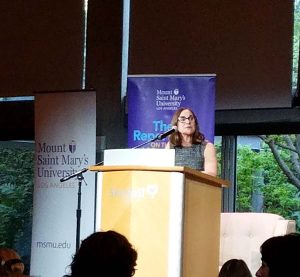
Ann McElaney-Johnson, President of MSMU
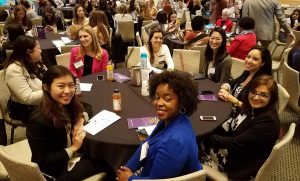
Photo Credit: Lindy Huang Werges
Panel: Maximize Your Health
Moderated by Jennifer Ferro, this panel discussed heart disease, breast cancer and diabetes – the diseases that affect women the most, and how lifestyle goes a long way in improving health and wellness. As someone who is dedicated to the study and eradication of breast cancer, Susan Love, MD, MBA brought to attention the complexity of the human breast and the lack of women in the field. She urged, “We need more women in research, in STEM, in Biology, or we are never going to figure it out.” In treating women impacted by breast cancer, we also need to ask them about collateral damages; “then might we be able to develop precision medicine and improve the quality of life for those affected,” she said. Wendy Slusser, MD, the associate provost for UCLA’s Chancellor Block’s Healthy Campus Initiative, agreed with this holistic approach to treating disease. She believes we need to change the definition of health – it is not just the absence of disease, and should not be expressed purely in medical terms; it is also about emotional and social wellbeing.
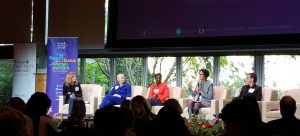
Photo Credit: Lindy Huang Werges
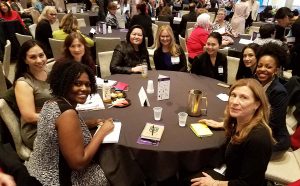
Photo Credit: Lindy Huang Werges
The panel also explored gender bias in disease. C. Noel Bairey Merz, MD pointed out that the implicit gender bias is one of the reasons why so few women know they have heart disease – most women dismiss their pain as other things, such as indigestion, and as a result their condition is left untreated. Similarly, Melissa Welch, MD, MPH said that like her, many women “took care of everyone except for myself.” Women often place their roles and responsibilities as a wife, a mother, and a caretaker before their own needs, and this needs to change. Dr. Welch emphasized, “It is ok for us to take care of ourselves and still be a good wife and mother.”
Panel: The Power of Wellness
We may not be able to control and change our genetic makeup and environment, but we can definitely manage our diet, exercise, and sleep. Moderated by Bryant Adibe, MD, this panel explored how proper stress management, nutrition, physical activity and sleep are vital to our health and wellness. It featured wellness experts Mallika Chopra, Kelly Dormandy, Paulette Lambert, Tierona Low Dog, and Susan Samueli. When asked what “wellbeing” means to her, renowned public speaker and author Mallika Chopra replied, “Wellbeing is about leading a happy, healthy, connected, and purposeful life.” She recalled asking her father Deepak Chopra for advice when she felt particularly exhausted, overstressed, and bloated one day. Together, they came up with the “Balance Wheel”, an exercise that helps individuals rediscover balance in their lives by asking questions such as: are we eating and sleeping well? Do we have a healthy relationship with those around us? Are we financially secure? Do we feel intellectually stimulated? Mallika also talked about her roadmap to living with INTENT: Incubate, Notice, Trust, Express, Nurture, and Take Action – a six-step process she developed to help her discover a healthy balance in her life.
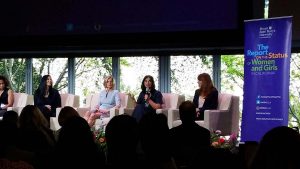
Photo Credit: Lindy Huang Werges
Featured Speaker – Geena Davis
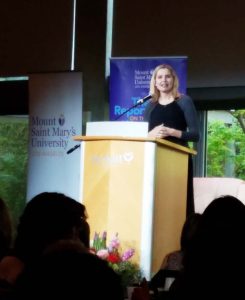
Photo Credit: Lindy Huang Werges
In addition to being an Academy Award winner, Geena Davis is perhaps best known for being the founder of the Geena Davis Institute on Gender in Media (GDIGM) at MSMU, the only research-based organization that works directly with media and entertainment companies to improve how girls and women are reflected in media. With the Geena Davis Inclusion Quotient (GD-IQ), a ground-breaking software tool that analyzes audio and video media content and uncovers unconscious gender bias with a depth that was not previously possible, the GDIGM found, among other significant discoveries, that male actors on average have twice as much screen speaking time as their female counterparts. As such, “we are now still unwittingly training our generation to view girls as the lesser gender,” said Geena. We see our values by seeing how we are portrayed in images and media, and the positive portrayal of women inspire girls to be more ambitious, pursue different, more diverse roles. Geena concluded, “If she can see it, she can be it… I am confident that the quality, quantity and diversity female portrayal in the media will improve dramatically in the next ten years.”
Architects of Change: Women’s Brains and Bodies
At the program’s VIP luncheon, guests had the opportunity to listen to and participate in an interactive conversation with Gwyneth Paltrow, Oscar-winning actress and founder of goop, and Roberta Brinton, PhD, an internationally recognized leader in Alzheimer’s research. Moderated by Emmy and Peabody Award-winning journalist Maria Shriver, the conversation explored the connection between women’s brains and bodies.
When “Alzheimer’s is 20 years in the making in your brain before symptoms manifest themselves,” said Dr. Brinton, we need to “take care of the caretaker.” Instead of constantly being at the end of the care line, women need to learn to love and care for themselves first. Highlighting the importance of physical exercise in slowing the progression of this dreaded disease, she remarked, “Exercise should be personalized… figure out what works for you,” as we are all different. After all, “What you do for your body, you do for your brain.”
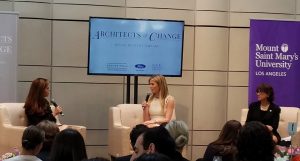
Photo Credit: Lindy Huang Werges
As the founder of goop, one of the most popular and trusted lifestyle sites out there, Gwyneth Paltrow is the go-to person for health and mindfulness advice. For her, “Health is being aware of your body and its physical limits.” In a culture where a lot of pressure is put on women based on how they look and what they do, self-acceptance is all the more important, and “not caring what others think is a blessing,” she said. The actress recalled that when her curiosity led her to try yoga years ago, along with many other practices, the media and the public thought she had lost her mind, even calling her a “witch” for her unconventional lifestyle choices. Yet today, yoga has become one of the most popular activities in America, with a yoga studio on almost every corner of the street.
